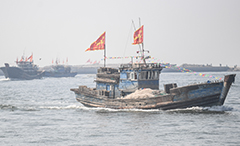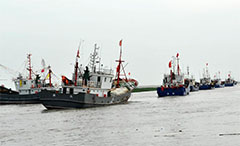China builds world’s first offshore fish farm
2017-06-05
cgtn.com
China has finished building the world’s first deep-sea fish farm off the coast of Qingdao city, East China’s Shandong province, incorporating the most advanced and sustainable technology in fish breeding. The mega-structure will soon be delivered to Norway as the Scandinavian country braves new waters in offshore fish farming.
“Ocean Farm 1” goes beyond the narrow definition of a farm, offering a fully-automated platform for marine projects and preparing the ground for testing the biological and technological dimensions of open ocean aquaculture.
It is “a full-scale pilot facility for testing, learning, research and development. It will be equipped for R&D activities, with particular focus on biological conditions and fish welfare. Aiming to reduce environmental footprints, improve fish welfare and answer acreage challenges,” reads an introduction page about the naval structure on the official website of SalMar, the Norwegian fish farm company commissioning the project.
Built by Wuchang Shipbuilding Industry Group, a subsidiary of the China Shipbuilding Industry Corporation, the semi-submersible facility exemplifies the progress and mastery of China’s naval engineering capabilities.
SalMar had provided an initial layout with their preferences, and the Chinese company conducted engineering design and construction. However, the construction process was not without hurdles.
According to Yan Jun, deputy chief engineer of Wuchang Shipbuilding Industry Group, the sheer size of the main body of the farm, up to 70 meters in height (or 23 storeys), pauses challenges for installation precision, especially that deep-sea waters are involved. The “unparalleled” technology will allow the farm to “float” in half-dive mode.
The 110-meters wide structure can contain 250,000 cubic meters in volume (equivalent to roughly 200 standard swimming pools), and withstand magnitude 12 earthquakes.
Some 20,000 sensors allow the marine site to achieve complete automation in monitoring and feeding the fish. The farm can mature up to 1.5 million in 14 months or 8,000 tons of fish.
The salmon market accounts for 20 percent of Norway’s GDP.
The super fish farm is also equipped with a 360 degree revolving gate for cleaning fish nets and driving fish shoals.
“The revolving gate requires an accurately rotating axis and the precise installation of the framework, which were installed using remote control methods with precision to the millimeter,” Yan noted.
Yan said technical transformation and the “Made in China” program are changing the face of China’s shipbuilding industry, giving it a competitive advantage and international recognition.
“We have achieved a safety record of 6.2 million error-free work hours and precision control of every part, every welding seam, every pipeline and every valve. That shows the level of upgrade of China’s manufacturing and the confidence of customers in China’s manufacturing,” said Chen Haiyong, director of the Norway fish farm project.
The fish farm was officially handed over to the Norwegian company at a ceremony on June 3. The structure will be sea transferred on June 10 to the coast of Norway, in a journey which will take up to six weeks.



